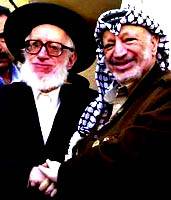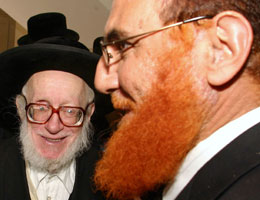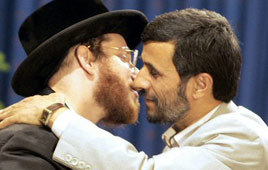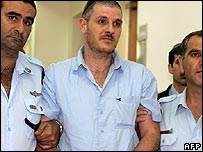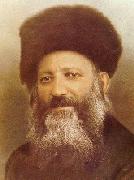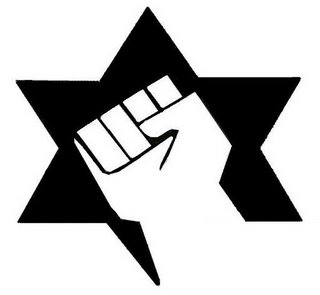 By Moshe Lerman
By Moshe LermanIt is Hanukka 5767. Once more, we commemorate the heroism of the Maccabees, and celebrate the rededication of the Second Temple by their hands, more than 2,000 years ago. It appears that heroism and the Temple are inextricably connected.
When David's desire to build the House of G-d was awakening, King Saul started persecuting him. The Talmud explains that the persecution brought in fact an important blessing. As a refugee in the village of Samuel the prophet, David learned from Samuel the secret of the exact location that HaShem had chosen. The location turned out to be on Mount Moriah, a place held by the Yevusim from before the days that Israel entered its Land. As King, David took it from the Yevusim, overcoming their awesome defensive powers in a heroic confrontation.
Later, after the return from Babylonia, in the time of Zerubavel, the Temple was rebuilt despite very stubborn resistance from the side of the gentile inhabitants of the Land and their constant attacks against the builders.
After the rule of the Maccabees had ended, Herod, illicitly appointed king of Israel by the Romans, broke down the Temple of Zerubavel and immediately rebuilt it as the center of his Temple Mount complex, which covers Mount Moriah until this day. His fabulous building projects aside, Herod's heroism was directed against the faithful. He was the murderer of many holy Jews, among them most members of the Sanhedrin.
The circle has closed. The desire to build the House of G-d is again awakening. Again, those who lead the awakening are subject to persecution by the ruling authorities. Once more, the location where the Temple must stand is not exactly clear, but it is definitely occupied by foreigners.
Our sages inform us about the secret revealed to David by Samuel the prophet. The following is my attempt to unravel it. I dedicate it to all those who were banned from their houses. May these dark days bring blessings and bear knowledge and comfort. "Give Truth to Ya'akov and Mercy to Avraham, as You have sworn to our fathers from the days of old (Micha 7:20)."
From the Talmud in Zevachim 54b, and from Rashi's commentary there, we learn that Samuel and David deduced the proper place of the Temple from hints in two conjugate verses of Torah, and from a hint from the book of Joshua in combination with another verse of Torah.
The reasoning starts with the two conjugate verses of Torah. The first hint is in a phrase said about Benyamin: "he dwells between his shoulders (Devarim 33:12)". The second hint is in a phrase said about Yehuda: "he rules from between his legs (Bereshit 49:10)."
The subject of the first phrase is Benyamin, while the word "dwells" (Shachen) hints at the Shechina, the dwelling of the Divine. The deeper meaning is that the Shechina dwells in Benyamin, between the shoulders of Yehuda. The subject of the second phrase is Yehuda, while the word "rules" (MeHokek) hints at the Sanhedrin. The deeper meaning is that the Sanhedrin rules in Yehuda from between the legs of Benyamin.
We learn from this that the Temple and its courtyards must be in a place where the portions of Benyamin and Yehuda are intimately intertwined. We know from a Beraita that this was actually the case:
"What was in the portion of Yehuda? The Temple mount, the chambers, and the courtyards. And what was in the portion of Benyamin? The Ulam (antechamber), the Holy and the Holy of Holies. And a strip comes out of the portion of Yehuda and enters the portion of Benyamin, and the altar was built on that." (Megilla 26a, Yoma 12a)
It follows that the border between Yehuda and Benyamin crossed the Temple area in North-South direction, at the eastern border of the Ulam. To the West of this North-South line was Benyamin's territory, and there stood the Temple itself. The Beraita informs us that the altar, right to the East of this line, was already on territory of Yehuda, and this territory was a strip coming out of Yehuda's main territory. There are sources that interpret the issue of the altar a little differently, and posit that the border was right to the East of the altar with a small strip of Yehuda entering Benyamin in the area of the altar.
We see now why Samuel and David went to look for hints in the book of Joshua. It is in this book that we find a detailed description of the border between Benyamin and Yehuda. The Gemara in Zevachim 54b explains that in the light of what is written in the verse "you shall rise up and ascend to the place (Devarim 17:8)," David and Samuel understood that it is significant that the border of Benyamin in the area of Jerusalem is described in terms of "going up":
"the border passed toward the waters of Ein Shemesh and its termination was in Ein Rogel. And the border went up at the valley of Ben Hinnom on the shoulder of the Yevusi, on its southern side – and here is Jerusalem – and the border went up to the top of the mountain, which faces in western direction the valley of Hinnom, the uttermost northern end of the valley of Rephaim. And the border turned around from the top of the mountain to the water of Neftoah, and went out to the cities of mount Ephron." (Joshua 15:7-9)
Ein Rogel was a deep source of water to the South-East of the Mount Moriah, located in the area where the valley of Kidron and the valley of Ben Hinnom meet. The border arrived at Ein Rogel from northern direction, probably passing in between Mount Moriah and the Mount of Olives. From Ein Rogel it arose to the top of Mount Moriah, along its southern shoulder. There it turned, as Rashi explains, to the water of Neftoah.
There are various explanations for what could be the water of Neftoah, but the most obvious choice is the spring of Gihon, the only natural open water source in the area. This spring is exactly south of the top of Mount Moriah, so that the border proceeds in North-South direction. From the water of Nefoah, the border turned again and left the area into northern direction, as again Rashi explains. I assume it follows the Tyropean valley, called valley of Hinnom in the book of Joshua, which separated Mount Moriah from what is now the Old City of Jerusalem.
And so, the territory of Benyamin in the area of the Temple has two legs, one ending in Ein Rogel, and the other in the Gihon spring. In between the two legs is a triangular strip belonging to Yehuda, which ends at the top of Mount Moriah. In accordance with the Beraita, the western border of this strip goes from North to South.
The Beraita implies that the whole area from the Ulam (or the altar) to the outer eastern wall belonged to Yehuda. So, this whole area must fit in the triangular strip, which gets smaller as it approaches the top of the mountain. As a consequence, the Temple cannot have stood to the North of the very southern part of today's Temple Mount complex. The exact restriction depends on the exact location of Ein Rogel, but in any case it follows that the Dome of the Rock does not stand where the Temple should stand. Rather, the abode of the Tempe should be searched for underneath the El Aqsa mosque.
We can now see how the hints of the above two conjugate verses are realized. Yehuda's area is in between the two legs of Benyamin. The natural southern mountain shoulder under the top of Mount Moriah is wholly in Yehuda as initially it curves slightly to the East. The place of the Shechina is to the West of this shoulder. Yehuda's shoulder on the other side is that of today's Mount Zion.
The thesis that the Temple did not stand on top of Mount Moriah solves a stubborn problem regarding the supply of living water for the Temple service. Such water was apparently supplied by an aqueduct, largely still extant today. It transported water to big extant cisterns under the surface of today's Temple Mount. The water brought down by the aqueduct originated from the Ein Etam spring in the area of Beth Lehem. If the Temple stood near the southern wall of Herod's complex, the cisterns were able to provide living water for the Temple service downstream. If the Temple stood on top of Mount Moriah, the cisterns could not have served this function.
In the days of Herod, there was another aqueduct that ran much higher than the one that entered the Temple Mount. In the environs of Beth Lehem some segments of the high aqueduct are still extant. The high aqueduct supplied water to the Old City, and was high enough to provide water to the level of Herod's Temple Mount complex. It seems very unlikely that such a high aqueduct existed during all of the Temple era. There are no scriptural or archeological indications that it existed before the Roman period, and there is no evidence that the necessary technology existed in ancient times. Moreover, a high aqueduct would have been very vulnerable, so that in times of war the enemy would easily have been able to disrupt the Temple service.
If the above thesis is true, how did we come to think that the Temple stood at the top of the mountain? As mentioned above, Herod was an evil man. Perhaps, then, the answer to the question is that the Herodian Temple indeed stood where is now the Dome of the Rock. In other words, perhaps Herod did not build his Temple at the original place.
I think that our sages hint at this in Bava Batra 3b/4a. It is explained there that after Herod had killed most of the sages, he spoke with the sage Bava ben Buta, who he had blinded, and asked him how he could make up for his deeds. Bava ben Buta answered to Herod that he should break down the Temple and rebuild it. How could Bava ben Buta say such a thing? I propose that he acted out of fear. Bava ben Buta feared further loss of life, and he feared that Herod planned to destroy the Temple anyway. By giving an advice that Herod could follow he saved his own life, and the lives of other sages, who Herod would need for the functioning of the Temple. Perhaps Bava ben Buta calculated that he could hasten the redemption in this way, as the tradition is that the third Temple will stand forever.
Herod the tyrant deceived the blinded Bava ben Buta. Herod was not looking to do Teshuva. He rebuilt the Temple for his own grandiose purposes, and in a different place. It was not a third Temple in its abode, and so it was up for destruction.
How can it be that the sages accepted the Temple of Herod? Herod created a sudden and truly cosmic dilemma. Non-acceptance of the new location would have meant the end of Judaism. The sages looked for signs and noted that during the building of the new Temple it rained only during the night, and not during the day. It seemed like Herod received assistance from Heaven.
In addition, they knew that David and Samuel had initially considered that the Temple be built at the highest place of the mountain, on top of the waters that came from Ein Etam (Zevachim 54b). Moreover, Herod arranged living water from the high aqueduct, solving a problem that likely was the reason for David and Samuel to choose a lower place. And so, the sages accepted the Temple at the new location as a continuation of the second Temple, and they sealed the matter out of fear for Herod, and to avoid doubt regarding the Temple service.
May the tyrants of this world soon and forever loose their power over the faithful of Israel, and may we soon merit seeing the third Temple in its abode!

